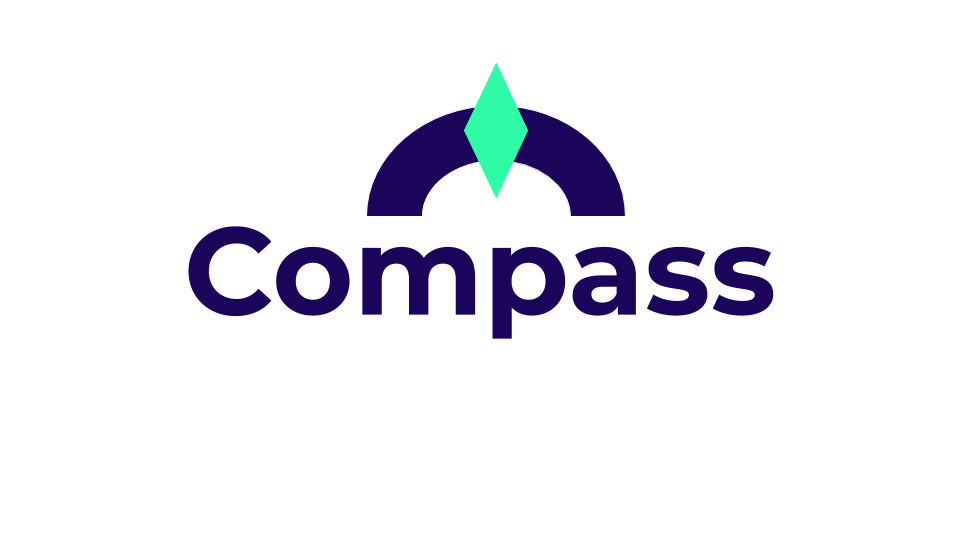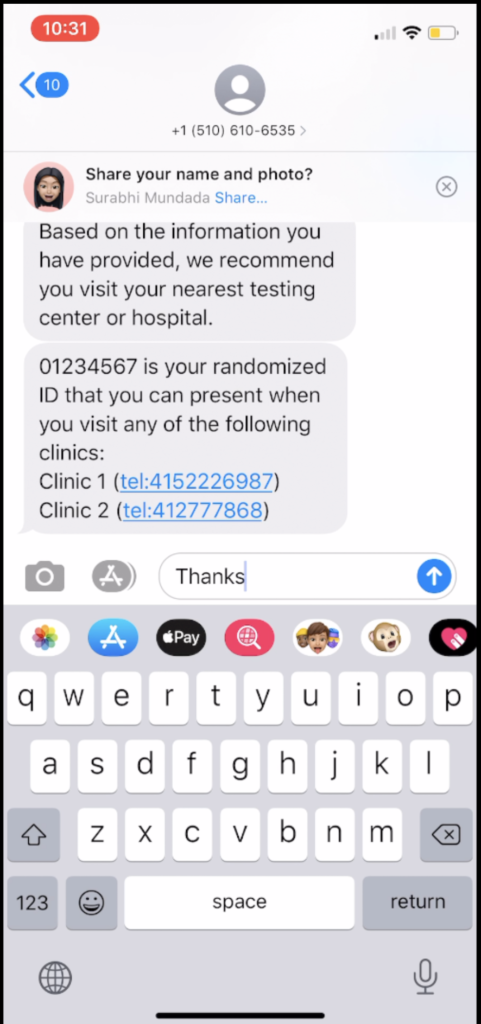Seven finalists have been selected to compete for $22,500 in awards in the Fall 2020 Skandalaris Venture Competition. In anticipation of the SVC finals, on December 8, 2020, we are publishing a Q&A series with the finalists. Today's featured team is Compass.
 About
About
We learned that triaging - assessing the risk of having a disease based on specific questions - was a very efficient model for directing users to testing centers without overwhelming local healthcare systems. Therefore, we developed Compass, an NLP-driven, HIPAA-compliant, SMS-based COVID-19 triaging platform for lower-income populations. Users can simply text our system and answer a series of physician-curated questions (offered in 11 languages) to assess their potential COVID-19 risk. Via our proprietary algorithm, users are assigned to one of our stratified risk levels and subsequently directed to the nearest affordable testing clinic. All received patient data is anonymized and securely stored in our database to identify geographical, financial, symptomatological factors driving COVID-19 transmission in lower-income areas. Acknowledging that COVID-19 has a timeline, we are expanding our platform to triage cancer and cardiovascular disease as well. Thus, we are partnering with an existing international digital health company to integrate their proprietary cancer prognostic algorithm with our SMS platform to bring affordable and accessible cancer screening to the U.S. market
Industry: Digital Health
Number of Employees: 8
Total Funding (as of November 2020): $6,000
What problem are you solving?
After speaking with public health experts, we learned about the disparate impacts of COVID-19 and how modern healthcare resources, such as websites or apps, are inaccessible to lower-income populations. This is due to less than 10% of the U.S. homeless population having access to internet-based services. Furthermore, a lack of health literacy among lower-income populations exacerbates the transmission and prevalence of other diseases as well, including communicable diseases such as STDs, but also more severe medical conditions such as cardiovascular disease and cancer.

About the Founding Team:
- Tejas Sekhar: Tejas Sekhar is a graduate student at Washington University in St. Louis studying Biology. He is passionate about leveraging medicine, technology, and social entrepreneurship to make the world a better place through radical and innovative thought. He is the founder of an international 501(c)(3) nonprofit organization and conducts ophthalmology research under Dr. Susan Culican through the WUSM Department of Ophthalmology and Visual Sciences.
- Jessika Baral: Jessika Baral is a fourth-year student at Washington University in St. Louis studying Genomics and Computational Biology. She is interested in the intersection of technology and medicine, especially in advancing public health initiatives. She founded a 501(c)(3) nonprofit focused on the arts and currently carries out research under Dr. Li Ding at the McDonnell Genome Institute.
- Prathamesh Chati: Prathamesh Chati is a third-year student at Washington University in St. Louis who is studying Biochemistry and Computer Science. He is interested in the interplay between emerging technologies and the various fields of healthcare. He currently serves as the Managing Director for Sling Health STL, conducts cancer biology research under Dr. Aadel Chaudhuri at the WUSM Department of Radiation Oncology, and co-runs a St. Louis public health non-profit called Heart for the Homeless.
- Aadit Shah: Aadit Shah is an MPhil in Bioscience Enterprise student at the University of Cambridge. Graduating with a degree in Biomedical Engineering from Washington University in St. Louis in 2019, Aadit previously exited a medical device company that developed a mobile retinal imager and currently leads Sling Health, a national biomedical incubator across 15 medical centers.
- Surabhi Mundada: Surabhi Mundada is currently a third-year student at Stanford University studying Computer Science, with a track focus in Artificial Intelligence. Surabhi’s main interest and experience lies in the intersection of health and technology. She has taken several classes at Stanford in this field, including Global Health and Technology in Low Resource Settings, Artificial Intelligence in Healthcare, and Biodesign courses. She is currently doing health-tech research with a lab at Stanford Medicine and with the mentorship of Apple Health teams where she is developing an app for tracking postoperative opioid use, as well as building the gap in healthcare communication between patients and clinicians.
- Neha Venkatesh: Neha Venkatesh is currently a third-year student studying Electrical Engineering and Computer Science at the University of California, Berkeley, with a specific focus on design and innovation. Her current research involves the intersectionality of health and tech, as she works to develop one of the only portable and affordable aerobiome sampling devices for use in field lab testing. She is also part of the Fung Fellowship, a groundbreaking entrepreneurship, and innovation program at UC Berkeley, that connects undergraduate students with industry partners to help apply technology-inspired solutions to societal problems. She has worked with several different startups, helping them re-establish their products through innovation and technology.
- Bhav Jain: Bhav Jain is a second-year undergraduate student at the Massachusetts Institute of Technology (MIT) studying Brain & Cognitive Sciences. He has a deep interest in leadership, healthcare, research, and innovation. At MIT, he is affiliated with the Whitehead Institute for Biomedical Research (WIBR) and Massachusetts General Hospital (MGH), where he conducts translational neurobiology research under Dr. Rudolf Jaenisch and Dr. Joan Camprodon. Additionally, he is the founder of a non-profit organization, the Connected Foundation, focused on combating social isolation among seniors through continued education and engagement from college students.
- Atharv Oak: Atharv Oak is a second-year undergraduate at the Massachusetts Institute of Technology (MIT), studying Biology and Mathematics with Computer Science. He is interested in all fields at the intersection of computer science, biology, and economics, especially in their applications to public good. He is currently working at a company to develop point of care diagnostics and performs research at the Whitehead Institute for Biomedical Research (WIBR) under Dr. David Sabatini.
What is the biggest lesson you’ve learned since starting your venture?
One of the biggest hurdles we encountered when developing this venture was understanding how to adapt our product to the changing landscape of COVID-19 related challenges that lower-income populations encountered. At the beginning of the pandemic, the primary issue in lower-income communities was affordability - lower-income populations simply did not have the payment methods necessary to finance COVID-19 testing and treatment. However, as federally-backed COVID-19 testing clinics became more prevalent, we had to pivot and add new functionalities to our product to maintain the product’s usability and necessity.
Our pivot strategies were dictated by speaking to community organizers and public health experts. A constant flow of information from those also participating in devising novel solutions to mitigate COVID-19 transmission was immensely beneficial to our success. It was through these conversations that we learned about the importance of actively engaging with community leaders and collecting information on the evolution of a particular problem.
What do you love about being an entrepreneur?
One of the most rewarding aspects of being a group of young entrepreneurs is seeing the excitement among prospective users and advisors when we pitch our product. As a group of young students simultaneously navigating academics and extracurriculars, seeing the impact that we can make through our innovations has driven us to continue pushing the implementation of our product. Hearing from mentors regarding how we can better tailor our triaging service to different communities has also been a very fruitful experience. Ultimately, it is the impact we are able to observe in the community that brings us a stronger sense of purpose.
What words of advice do you have for those interested in starting a business?
When young innovators watch YouTube videos of famous founders giving speeches on how they developed Facebook or Google, these founders often describe innovation as a very natural process with little structure and definition. The innovation process, however, is rather rigid and requires a deep understanding of how startups work and develop into a company with millions of users. Founders need to do more than just solving a relevant problem - they need to consider market sizes, competitors, pitching strategies, accessibility, affordability, and a plethora of other factors when developing a successful company. One of the best ways to learn more about the startup development process is to watch educational videos online. One of the best video sets is provided by Y Combinator on YouTube. They have developed an educational program to help young founders navigate the precarious journey to creating a successful startup. Becoming knowledgeable on the components of a successful startup will ultimately help accelerate the implementation of your innovation.
Website: covid-compass.com
Facebook: https://www.facebook.com/compasscovid

